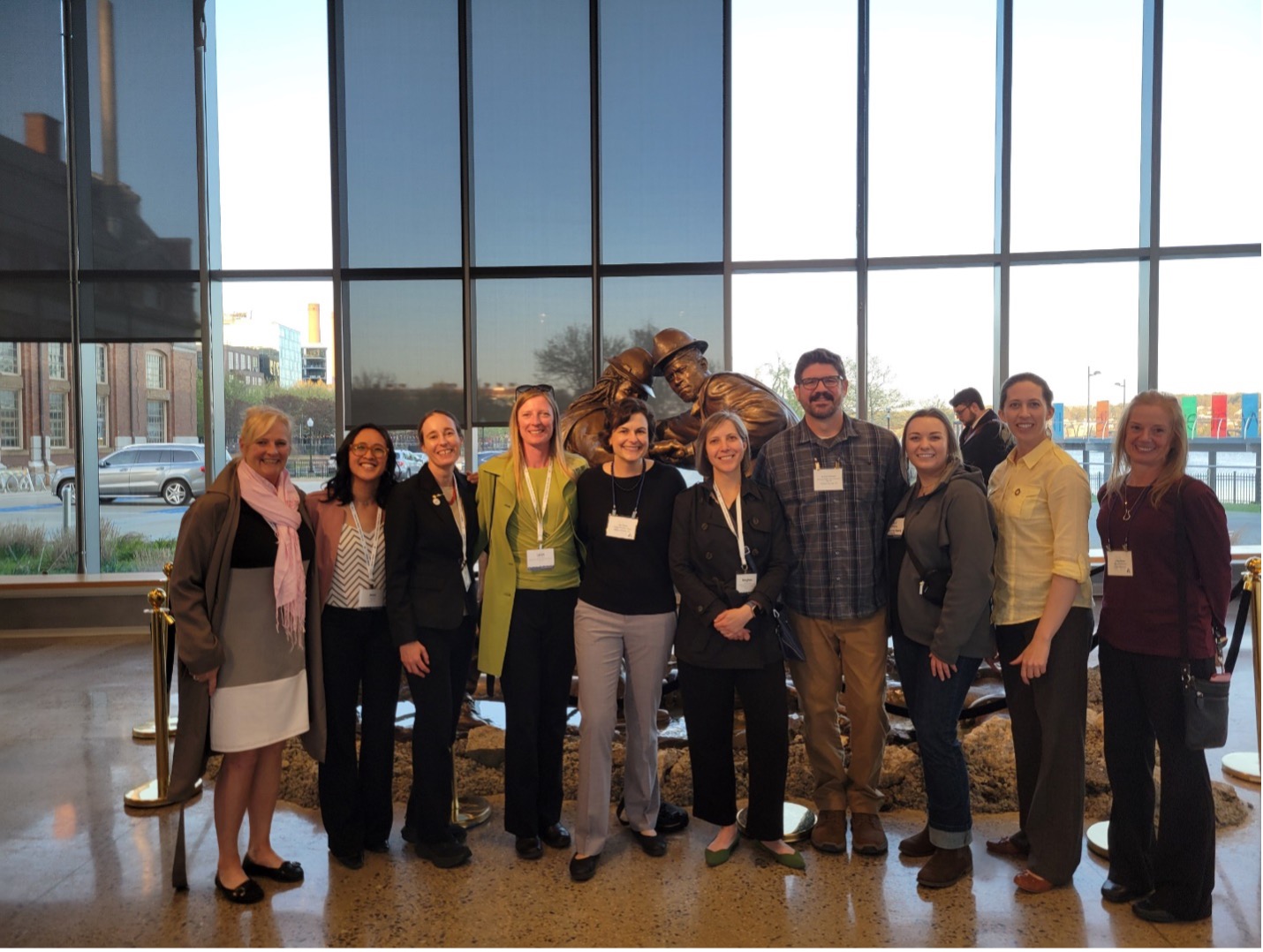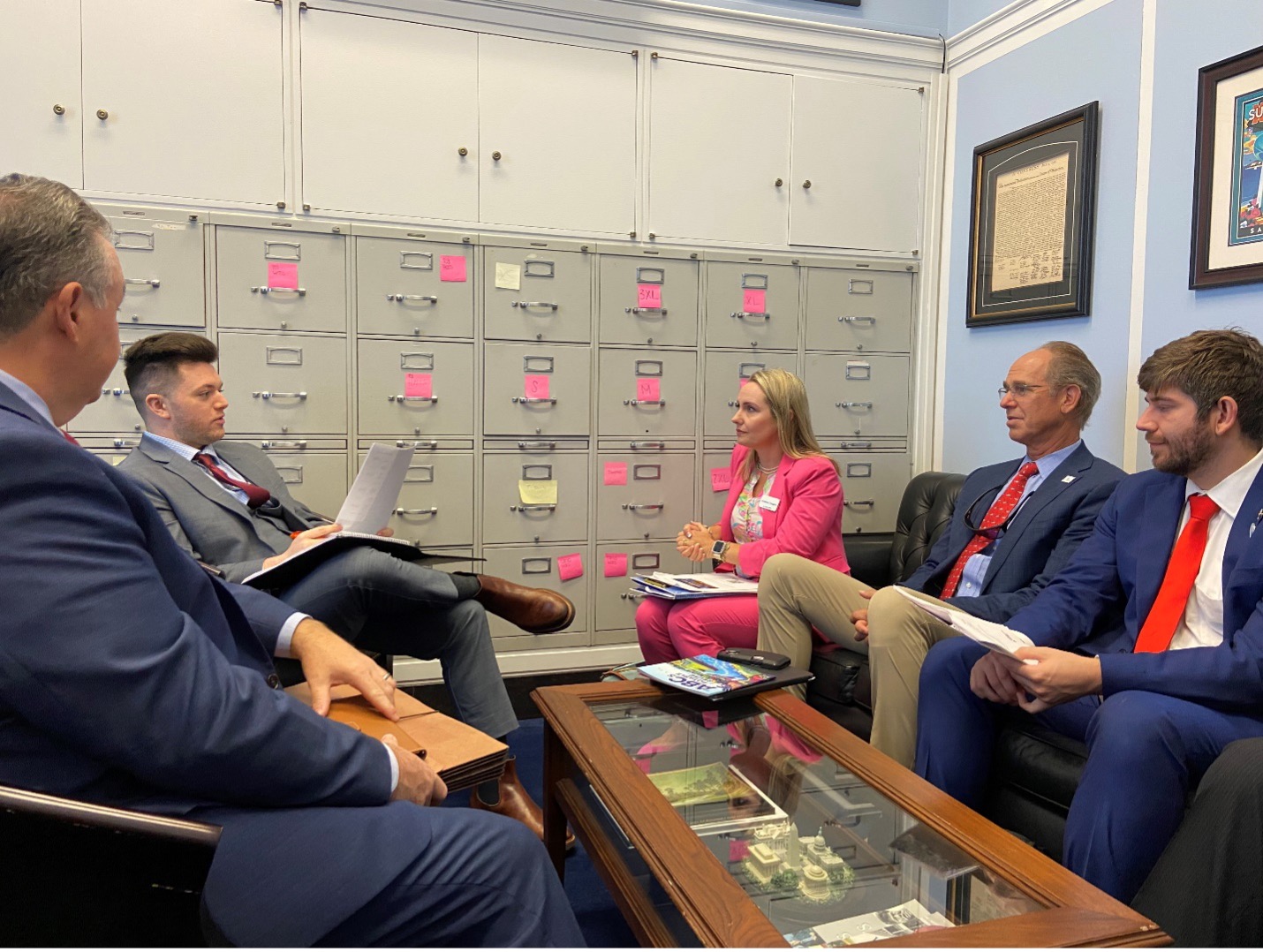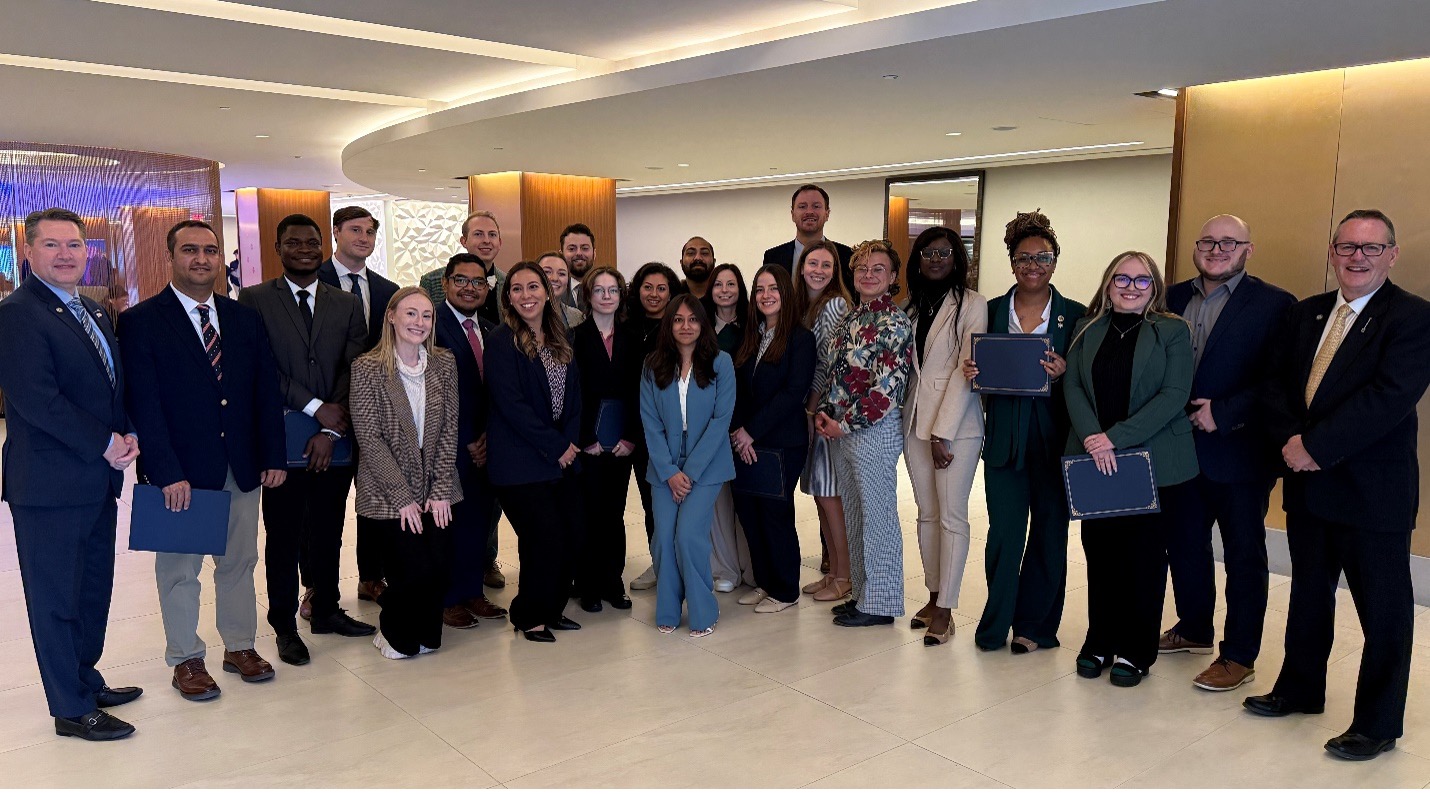Takeaways from the 2025 National Water Policy Fly-In
In April, hundreds of water professionals from across the country gathered in Washington, D.C., for the annual National Water Policy Fly-in. Participants from RMWEA and Rocky Mountain AWWA met with all Members of Congress in Colorado, New Mexico and Wyoming to highlight the critical need for infrastructure funding, advocate for common-sense PFAS legislation and ask for support for a bill that would require labeling on so-called “flushable” wipes.

Water professionals representing RMWEA and RMSAWWA convene at the National Water Policy Fly-In in Washington, D.C., to meet with legislators and advocate for the water industry on key issues.
We caught up with two veteran Fly-in participants to learn more about why water advocacy is important and what they see as successes and challenges in working with Congress.
Carol Martinson is a Process Engineer at Providence Engineering and Environmental Group in Wyoming and has been attending the Fly-in for five years.
What is something you’ve learned from attending the Fly-in?
Consistently showing up and being clear about what our industry needs are critical when talking to legislators. If you don’t ask for it, it definitely won’t happen. We need to help legislators understand what our industry is facing and what our concerns are.
The pace of making change at the federal level can sometimes seem really slow, at least in the water sector. What are some successes you’ve seen since you’ve been attending the Fly-in?
General understanding and support for the needs of the water industry are better understood in Washington since I started attending the Fly-in five years ago. We’ve highlighted PFAS, the “flushable” wipes issue, and funding needs. Once we start talking about it, the understanding is better.
A specific example is when Senator Lummis (R-WY) introduced the bill to protect utilities from PFAS liability. That was a clear request and an example of “it won’t happen if you don’t ask for it.” We’re still working on getting a PFAS liability bill passed, but it’s progress.
What stood out for you this year?
With shrinking budgets across the country, it’s important that we as water professionals continue to explain the importance of programs like wastewater-based epidemiology, state revolving funds and grant programs – things that are impactful to our communities. People can’t always see the benefits of water and wastewater investments. It’s our job right now to explain the value of those clearly, so we don’t lose the support that we’ve gained over time.

Although it was more chaotic in Washington this year, we also had more involvement than other years at the Fly-in, including a large contingency of young professionals because of the success of the YP Fly-in scholarship program. It was fantastic to see new energy from new people learning how to participate and being so excited to be there.
Young professionals attend the National Water Policy Fly-In as part of the
Water Environment Federation’s Young Professional Scholarship Program.
How can people get involved in water advocacy even if they can’t go to D.C.?
People can have a huge impact through the WEF Water Advocates Program and by contacting their legislators to express concerns. The Advocates Program makes it easy. Right now there are messages on the benefits of biosolids, PFAS liability protection for utilities, and the “flushable” wipes bill. Legislators also have offices in your state, so you can easily contact them, tell them who you are, why you care about water, and what you need from them.
What’s the most fun thing about attending the Fly-in?
Connecting with other water professionals who are as passionate as we are. There’s nothing that quite provides the same energy boost as being around our friends and colleagues in the water industry.
Julie Tinetti is the Regulatory Compliance Manager at Highlands Ranch Water in Colorado. With over a decade of experience in her role, she has attended the last three consecutive National Water Policy Fly-ins in Washington, D.C.
What is something you’ve learned from attending the Fly-in?
One of the most valuable lessons I’ve learned is the power of collective advocacy. When we come together as a unified voice from across the country, it amplifies our message and helps legislators understand that these issues are not isolated—they’re national in scope. The Fly-in is a unique opportunity to present a consistent, coordinated message to Congress, and I’ve seen firsthand how that can shift perspectives and open doors for meaningful dialogue. It’s also taught me that persistence matters. Change doesn’t happen overnight, but showing up year after year builds credibility and trust.
The pace of making changes at the federal level can sometimes seem really slow, at least in the water sector. What are some successes you’ve seen since you’ve been attending the Fly-in?
Progress can feel incremental, but it’s real. One of the most encouraging developments I’ve seen is the growing awareness and support for a PFAS CERCLA exemption for water and wastewater utilities. When I first started attending, there was a lot of confusion and hesitation around this issue. This year, however, Colorado’s congressional delegation seemed much more informed and receptive. That shift didn’t happen by accident—it’s the result of sustained advocacy and education. It’s rewarding to see our efforts begin to bear fruit, even if we’re not at the finish line yet.
What stood out for you this year?
This year, I was struck by the level of engagement from new legislative staffers in Colorado’s congressional offices. Many of them were eager to learn and asked thoughtful questions about the challenges utilities are facing. It was a reminder that part of our job is to be educators—we’re not just asking for support, we’re helping policymakers understand the real-world impacts of their decisions. I also noticed a stronger sense of camaraderie among the Fly-in participants. There’s something energizing about being surrounded by people who are just as passionate about water as you are.
How can people get involved in water advocacy even if they can’t go to D.C.?
There are so many ways to make your voice heard without ever stepping foot in Washington. Writing letters or emails to your congressional representatives is incredibly impactful, especially when you can share a personal or local perspective. Joining a coalition of like-minded utilities or professional organizations can also amplify your message. I always recommend the WEF Water Advocates Program—it’s a great resource that makes it easy to stay informed and take action. And don’t forget about local offices—your representatives have staff in your state who are often more accessible and just as influential.
What’s the most fun thing about attending the Fly-in?
For me, it’s the people. Meeting water professionals from all over the country, sharing stories, learning from each other—it’s incredibly inspiring. There’s a sense of shared purpose that you don’t always get in your day-to-day work. The Fly-in recharges my batteries and reminds me why I do what I do. It’s also a great opportunity to mentor newer professionals and help them find their voice in advocacy. Watching young professionals step into this space with enthusiasm and confidence is one of the most rewarding parts of the experience.
Are you interested in attending a future Fly-in? RMWEA members are encouraged to get involved in the Government Affairs Committee to learn more. We’re always looking for committee members from diverse places and backgrounds! Email Leah Cribari (lcribari@bouldercolorado.gov) or Meghan Wilson Outcalt (wilsonm@bouldercolorado.gov) for more information.
Author Bios
Meghan Wilson Outcalt is the Water Quality Senior Manager at the City of Boulder and the Vice Chair of the RMWEA Government Affairs Committee.
Cassidi Rosenkrance is a Water Quality and Treatment Manager at Denver Water and is currently serving as the chair of the RMSAWWA Colorado Water Utility Council.
